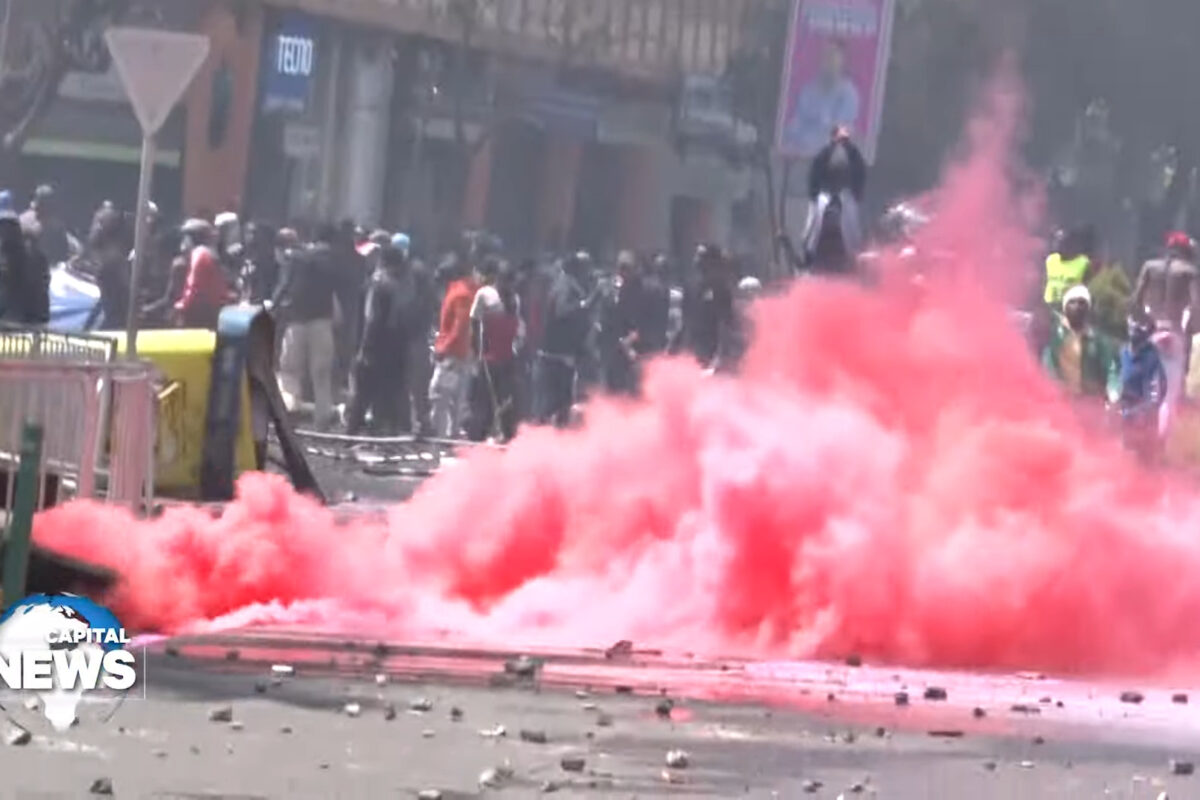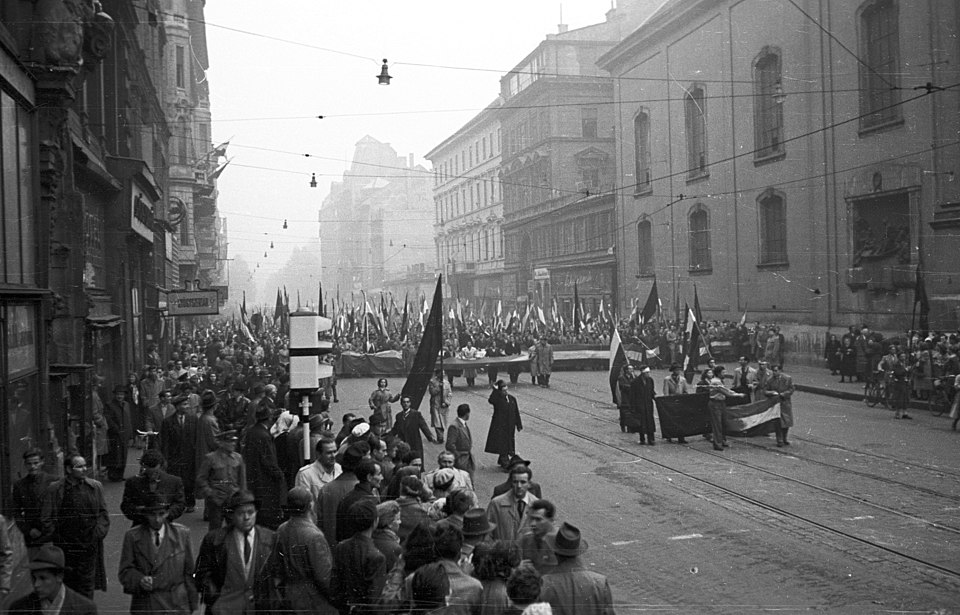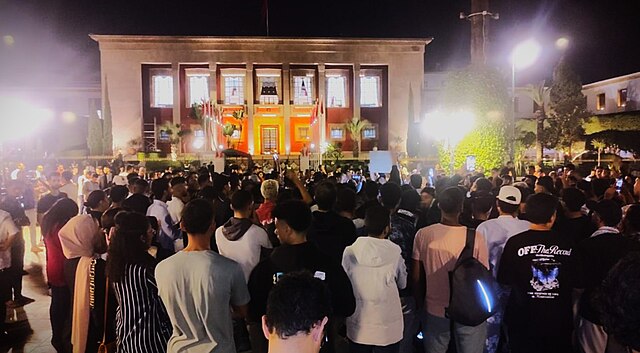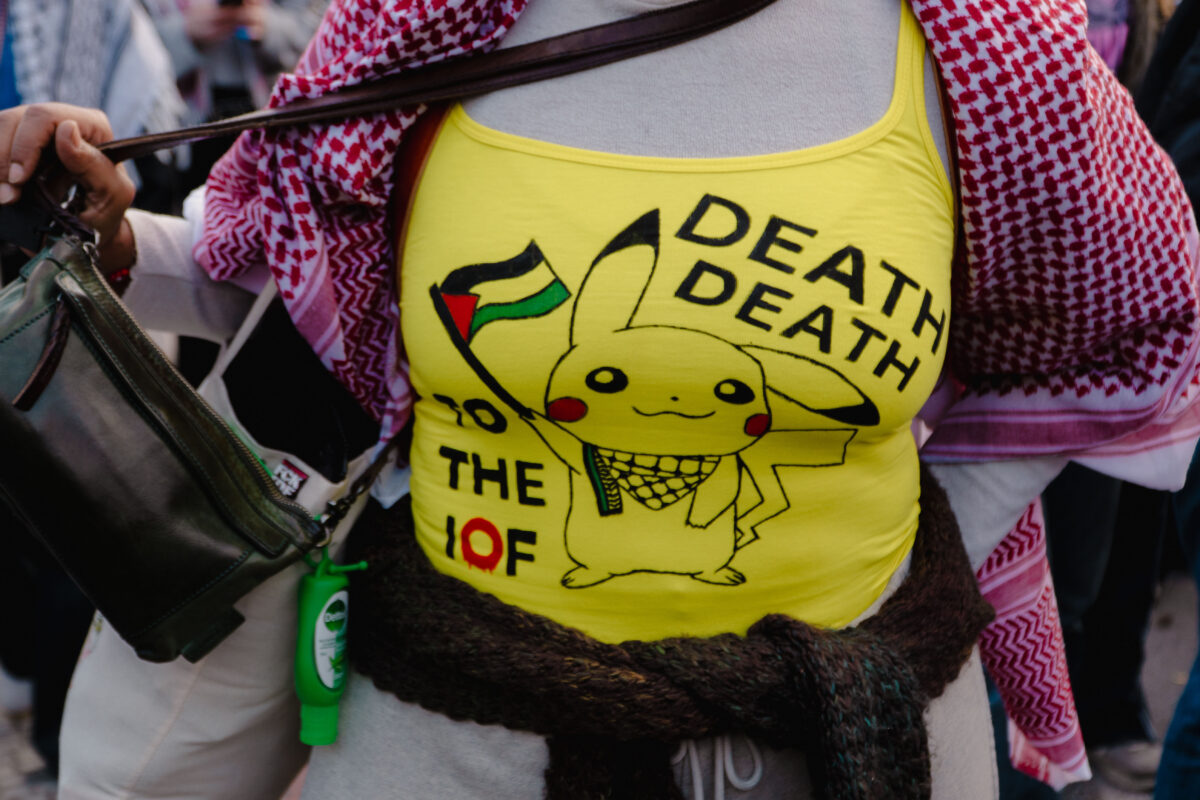Mass protests have marked Kenya’s recent past and are now growing with the angry people who are tired of unemployment, high costs of living, excessive police violence, injustice and the neo-colonial corruption. The police response is – as usual – brutal use of force with at least 16 people killed and 400 injured on the commemoration day of the June 25th 2024 youth uprising that left sixty killed, hundreds injured and many tortured and disappeared. Yet, this time Kenya’s Gen Z is determined to keep on going and resist.
Recently, on July 7th more people have been shot and arrested at the protests for the 35th anniversary of the so called Saba Saba – “seven seven” – uprising in 1990 where people pushed the one party state towards democtartic transition.
As I landed at the airport of Nairobi in December 2024, installed an app and ordered a taxi to pick me up, I waited at the driveway of the quite large taxi square so the driver could easily spot me. He arrived, welcomed me, I threw my small bag on the back seat and jumped in. About twenty meters further we were stopped by a police officer who demanded he pay a KES 2000 – approx. $15 – fine for stopping in the wrong place. We didn’t block any traffic and the whole procedure took about ten seconds. Luckily the driver was nicely articulate, telling the officer that since I’m a tourist I couldn’t yet know the country’s rules, so he wanted to be nice and stop where I was standing. I switched on my biggest smile and apologized for my stupidity. The cop let us go.
The driver turned out to be extremely friendly, chatty and angry – angry at the corrupt police and the politicians who just harass hard working people instead of doing something to enhance their lives. All the way downtown he explained to me how the country works, or doesn’t work. The fines like ours are a common practice – I heard more similar cases throughout my stay – and the airport even has its own lock up for the ones, like the driver, who cannot pay. He told, since most of the customers now pay through the app, he doesn’t even carry much cash – let alone the KES 2000 would be his whole day’s salary. Usually, since it was Friday evening, he’d stayed locked up until Monday when there would be the next chance for a short court ruling to release him.
Yet, this is just a teeny-tiny tip of a tremendous iceberg of police violence, suppression of opposition and protests, clientelism, tribalism and neo-colonial imperialism.
In June 2024 protests against a proposed, International Monetary Fund (IMF) backed, tax bill on essentials like bread or cooking oil, sparked an almost spontaneous mass uprising. This was first led decentralized by the Kenyan educated middle-class youth active on social media but soon connecting more groups, like the “hustlers”: street vendors, waiters or taxi-app-drivers who need to top up their small salaries or for whom the informal sector is the only means of income – up to 85% of Kenyans earn their living through informal sector.
“We wake up every day to go and hustle, but you can’t even buy anything these days because life has become so expensive,” said Daniel Mwangi, a 32-year-old informal worker, as he weaved his way through the crowd on the streets clouded pink from water cannon spray.
“We don’t have work so we can be here [protesting] every day. If we can’t find something to live for, we will find something to die for.”
Yet, the protests were not merely about the tax but of a deeper structural issues that lie in the country’s colonial past and the imperialism of the present. In 2024 women were marching against femicide, there were strikes by doctors, teachers, and university lecturers, workers resisting the planned privatisation of Nairobi’s Jomo Kenyatta International Airport, as well as university students opposing the new tuition funding model.
However, Kenya has long been struggling with the interest payments of loans from the International Monetary Fund (IMF) and World Bank that take up to 37% of annual revenue. The proposed finance bill by president Ruto aimed to raise an additional $2.7bn in taxes for the debt load. Yet, since the extrajudicial killings and massive use of police violence didn’t seem to hold back the protesters, Ruto eventually gave in, withdrew the bill and appointed a new cabinet – only to sign a new bill a year later to be implemented July 1st 2025 with eg. increased VAT and cease of zero rated products like milk, bread and flour. However, the street protests 2024 reduced over time, but killings, arrests and disappearances continued, triggering more anger towards the authorities. In particular, the gigantic urban informal settlements, like Mathare in Nairobi, have been the main targets of extrajudicial killings and police violence in recent years demonstrating the inherent structural class struggle in the country.
Now one year later the unlawful killing of the teacher and blogger Albert Ojwang in police custody after reportedly criticising a deputy police chief on social media has sparked the protests of the furious Gen Z – as the organic and decentralized movement calls itself. In addition, during the demonstrations over Ojwang’s death, police shot the vendor Boniface Kariuki, who was selling masks on the street, at close range; an incident that fuelled more outrage. Despite police firing teargas and water cannons, hitting with batons or whipping and even shooting, the crowds keep taking to the streets in the major cities of Nairobi, Mombasa and Kisumu but also elsewhere in the country. The protesters are calling for the president William Ruto to step down but are also fighting for thorough political change against the corrupt elites and imperialist, neo colonial exploitation structures.
The long tentacles of settler colonialism
What is now Kenya has been colonised and exploited by the British East African Company since 1895. Yet, when the country was eventually incorporated into the British Empire as a “crown land” in 1920, large parts of the fertile land were taken from the local population. The areas were declared ‘White Highlands’ and taken over by white settlers who soon established an apartheid structures similar to South Africa. From 1923, the colonial authorities banned Africans from owning any land outside the reserves. The many indigenous farmers who had become landless and thus destitute had no choice but to work on white-owned farms. In this way, the mostly wealthy white settlers secured a constant flow of cheap labour. Moreover, the white colonialists established prisons as well as prison camps to fasten their power and to imprison people for “crimes” they did not know of, as well as to pay outrageously high fines. Prisoners were obligated to work on agriculture and public projects and forced labour was considered an essential part of the colonial economy.
This exploitation and accumulation structure with the confiscation of the land led to a rural exodus to the large urban centres and laid down the dynamics that continue to shape the inequality and Kenya’s imperial dependency until today. Although resisted with various means from already early on, the repression and impositions by the colonial state eventually culminated in the outbreak of the anti-colonial, socialist Mau Mau uprising in 1952. This would modify the already brutal colonial prison system into a detention of tens of thousands of Mau Mau at concentration camps. Mathare, one of the poorest neighbourhoods in Nairobi, can be traced back to such a concentration camp under British colonial rule.
Yet, despite the fierce and successful Mau Mau insurgency for independence, the country never became truly self-determined. Jomo Kenyatta, the first president of Kenya and once one of the masterminds of the anti-colonial struggles, with his KANU party soon turned the new independent Kenya into a neo-colonial, anti-socialist, de facto one party state banning its rivalry, socialist Kenya People’s Union and ousting the Mau Mau movement and its members who once risked their lives for the independence but haven’t received any compensation until this day. Thus, Kenyatta seized the power from the UK and the white settlers but kept the old unequal class structures that culminated into the question of resources and land just handing the colonial power over to his own political as well as tribal group. Hence the exploitation of the people continued just by the Kenyan own capitalist, Global North educated, elite.
What is more, the new “independent” government did not wait for long to commit its first assassination of the popular pan-Africanist revolutionary Pio Gama Pinto in 1965. Pinto – among others – had continued pushing for a socialist transformation and economic emancipation against the new neo-colonial imperialism and was also connected with the global anti-imperialist and socialist movements as well as Malcolm X in the US. Hence, he faced the same fate as many socialist, internationalist leaders of the time.
“By the time of Kenyan independence, he [Pinto] had reached a point where he could oust the capitalist, conservative ruling elite that had replaced the colonial powers,” says Wunyabari Maloba, professor of African studies and history at the University of Delaware. (Al Jazeera)
Yet by the end of the 1970s, British companies that had remained in power- such as Unilever (formerly East Africa Industries until 2000) – and other multinational corporations controlled most of Kenya’s key economic sectors, like agriculture, infrastructure, and finance. The “independent” state continued protecting their operations and wealth accumulation abroad while the local working class impoverished and the inequality in the country arose. Hence, until today, the majority of the country’s economy remains under foreign capital and just 0.1% of Kenyans own more wealth than the remaining 99.9%.
In addition to the old colonial framework, Kenyan leaders have also made use of the post-colonial exploitation instrument of the “Western” imperial powers: the loans of the IMF and the World Bank. These loans came with vast economic and political reforms, the Structural Adjustment Programmes (SAP), with privatisation of a wide range of profit-making parastatal companies in eg. tourism, brewery, pharmaceuticals and heavy industry as well as a high raise of tuition fees in universities in the end of the 1980s and the beginning of 1990s.
In practice, healthcare, education, housing, and food subsidies were gutted. Kenya became emblematic of the post-colonial state Frantz Fanon warned against, subject to the ‘pitfalls of national consciousness’ and a vehicle for elite and imperialist interests. With this transformation, the NGOs from the Global North started to pour into the country with their donor money and neoliberal, hegemonial frameworks. This white saviorism depoliticised the struggle and transformed local activism into the well known dependency structures
Furthermore, due to its geographic location in East Africa, Kenya is of imperial military interest. The US maintains a permanent army presence in Mandela Bay, close to the Somali border. Operations in the neighbouring country are coordinated from here, but the base has also played an important role in the planning and execution of the US drone war in Yemen in recent years. Also, the United Kingdom uses the country primarily as a training base for its own armed forces, the British Army Training Unit in Kenya (BATUK). There are 300 British soldiers permanently stationed at a total of five bases in the country. Moreover, Israel also maintains close relations with Kenya. This goes back to even before the founding of the Israeli state. Before Palestine was eventually chosen as the country for the settlement, parts of the Zionist movement were in favour of founding a state in the British colonies of East Africa. Indeed, a small number of Zionist settlers made Kenya their new home at the beginning of the 20th century, laying the foundations for a long-lasting and strategic relationship between Israel and Kenya. For many years, the General Service Unit, a special paramilitary police unit specialising in counter-insurgency, was trained by Israeli services.
Enough is enough
The Kenyan government has now been imposing further SAP austerity measures although these evidently lead to further poverty and division of the working class with income inequality, unemployment and lower living standards and therefore increased crime rate, discrimination, ethnic tensions. Indeed, while Kenya’s economy has grown, salaries haven’t improved and especially the now higher educated youth face hardships in finding employment to finance the increasing living costs. The IMF bail outs including removing subsidies has led to a skyrocket of food prices and fuel causing intolerable electricity bills as well as more expensive transportation since there is no public transportation network in Kenyan cities but privately owned matatu companies – the minivan buses typical to the African continent.
While many of the “hustler nation” sense marginalization and disempowerment, the old political elite around the descents of Jomo Kenyatta and his sphere have continued their lavish lifestyle as business as usual with private jets and new fleets of luxury vehicles shown on social media. Yet, now Gen Z is determined to rise against this inequality and fight austerity, the IMF and neo-colonial exploitation. Inspired by the Arab Spring, Hong Kong’s Umbrella Movement and Nigeria’s #EndSARS as well as equipped with encrypted messaging applications and Telegram groups for organizing, Kenyan youth are calling for their own solutions of governance and self-determination without political party support but from the bottom. Most significantly, in a country where ethnicity based “tribalism” has long been the key nominator in politics, economy and leadership, there now seems to be a shift into a more class-based consciousness and solidarity. Now, the Gen Z protests collect people together across ethnic, regional, class, gender or generational lines and cut ties with the business leaders who, as the protesters see it, are the complicit in the capitalist exploitation structure.
We can only hope the class struggle also reaches the Kenyan soldiers – as it has been the case in other African countries in a revolution, such as Burkina Faso – to stop the future imperialist military interventions from the US, UK and Israel backed army bases. Indeed, the UK BATUK forces are have been committing vast human rights violations, including rape, mistreatment, torture, unlawful detention, and killings sofar acting in impunity. The unit is also accused of destroying land and using toxic chemicals in their trainings. Needless to say, it seems that these troops would not leave the country just upon a friendly request. Yet, the example of Sahel has so far shown that it is possible to erase the “Western” imperialist military from an independent soil.
However, during my stay in Nairobi, I spent quite some taxi journeys chatting and wondering about the brand new Nairobi Expressway, a 27-kilometre toll highway straight on top of an older road through the city connecting the airport with the higher middle-class neighbourhood of Westlands. Why build a new expensive high way for private cars that only benefits the wealthy instead of eg. a proper tram network in a city that is shocking in traffic and pollution and where the working class keeps stuck in the overcrowded matatus and a motorbike taxi is often the only proper way forward? Throughout my travels in various African countries, I’ve been constantly given the same answer to my questions about resistance: “We are demoralized. In the past it was clear who the enemy is but now we are exploited by our own people.” Yet, the Gen Z seems to be now changing this mindset with social media as a tool of organizing and spreading the word and the power and the sense of a new inclusive solidarity and comradeship.




